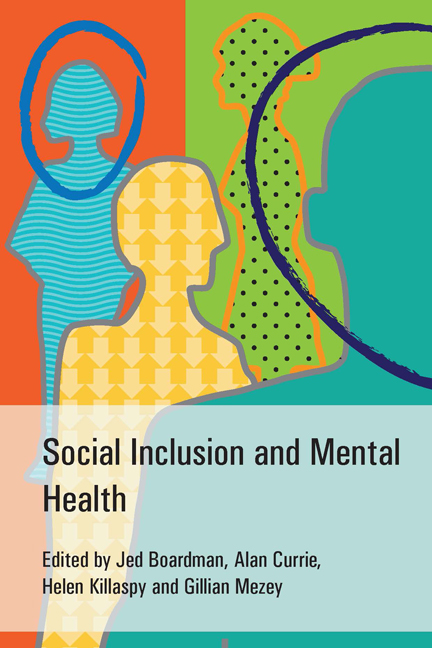Book contents
- Frontmatter
- Contents
- List of contributors
- List of tables
- Foreword
- Preface
- Acknowledgements
- Scoping Group on Social Inclusion, Royal College of Psychiatrists
- Part 1 What is social exclusion?
- 1 Introduction
- 2 Concepts of social exclusion
- 3 Social exclusion of people with mental health problems and learning disabilities: key aspects
- 4 Policy and social exclusion
- 5 How is social exclusion relevant to psychiatry?
- 6 Socially inclusive working across the psychiatric subspecialties
- Part 2 Social exclusion: the scope of the problem
- Part 3 Working towards inclusive psychiatry
- Index
4 - Policy and social exclusion
from Part 1 - What is social exclusion?
- Frontmatter
- Contents
- List of contributors
- List of tables
- Foreword
- Preface
- Acknowledgements
- Scoping Group on Social Inclusion, Royal College of Psychiatrists
- Part 1 What is social exclusion?
- 1 Introduction
- 2 Concepts of social exclusion
- 3 Social exclusion of people with mental health problems and learning disabilities: key aspects
- 4 Policy and social exclusion
- 5 How is social exclusion relevant to psychiatry?
- 6 Socially inclusive working across the psychiatric subspecialties
- Part 2 Social exclusion: the scope of the problem
- Part 3 Working towards inclusive psychiatry
- Index
Summary
Over the past 20 years there has been a considerable increase in UK government policy initiatives in the area of mental health, as witnessed by the number of official documents produced on mental health policy (Boardman, 2005). It is not the intention in this chapter to review mental health policy, but to give an overview of aspects of health policy that relate to social inclusion and recovery. However, as shown in the previous chapter, the components of social exclusion go beyond those traditionally dealt with by health services and cover several different government departments, such as those that deal with justice, employment, housing and education. It is therefore inevitable that we should examine cross-cutting aspects of policy and some of the policy initiatives since 1997, when the Labour government was elected, that have focused on social exclusion and poverty reduction. The focus of the chapter is on policy in the UK, but some European policy is relevant and therefore included.
Equality and rights
Human rights
Before 1997 there was no codified human rights in UK domestic law, although the UK had ratified the European Convention on Human Rights (ECHR) in 1951, which meant it was bound by international law to observe the ECHR and was accountable for violations. The European Court of Human Rights in Strasbourg had been set up to consider cases brought by people who claim that their rights under the Convention have been broken or breached and consequently may rule that the British government has breached the Convention.
Equality and human rights were part of the Labour election manifesto in 1997. The Human Rights Act 1998, which came into force in October 2000, gave UK citizens certain basic human rights which government and public authorities are legally obliged to respect (Box 4.1). It gives legal effect in the UK to 15 of the fundamental civil and political rights and freedoms contained in the ECHR (sometimes referred to as the Convention), originally written in 1950. The rights granted by the Human Rights Act are often referred to as ‘Convention rights’. This means that the Convention rights can be enforced in UK courts, which can make judicial declarations of incompatibility.
Importantly, the Human Rights Act 1998 says that public authorities must respect people's Convention rights and that it is unlawful for them to act in a way that is ‘incompatible with a convention right’.
- Type
- Chapter
- Information
- Social Inclusion and Mental Health , pp. 46 - 70Publisher: Royal College of PsychiatristsFirst published in: 2017



